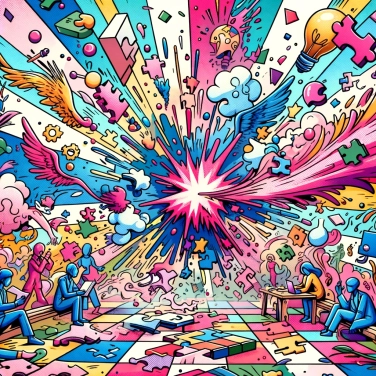In detail, for those interested!
Development of divergent thinking
Puzzle games can contribute to the development of divergent thinking. Divergent thinking is the ability to generate a variety of ideas, solutions, and different perspectives for the same problem. By engaging in stimulating games, individuals are encouraged to explore creative approaches, think in a non-linear way, and consider alternative possibilities. This regular practice encourages mental flexibility and nurtures imagination. By promoting the search for multiple solutions to a given problem, puzzle games stimulate creativity and the ability to think inventively. Divergent thinking is essential in the process of creation and innovation, and puzzle games can be an effective tool to develop it.
Strengthening cognitive abilities
Puzzle games are known to enhance individuals' cognitive abilities. Indeed, these games stimulate various brain functions such as attention, memory, logic, and problem-solving. By exercising these different faculties regularly, players can improve their mental processes and their ability to process information more effectively.
Encouragement of critical thinking
Puzzle games encourage critical thinking by stimulating players to evaluate, analyze, and question the information and situations presented. By solving puzzles and complex problems, players are led to develop their ability to think logically, anticipate the consequences of their actions, and make thoughtful decisions. This critical approach promotes the development of analytical thinking and the ability to objectively evaluate the different available options. Ultimately, puzzle games encourage players to adopt a more thoughtful and reasoned approach to the challenges they face, strengthening their critical thinking and decision-making skills.
Improvement of problem-solving skills
Puzzle games are known to stimulate problem-solving improvement. Indeed, by playing games that require finding solutions to complex puzzles or obstacles, players are constantly challenged to think critically and strategically to progress. This regular practice of problem-solving in a playful environment helps develop essential cognitive skills. Players learn to analyze situations, identify obstacles, and develop effective strategies to overcome them. This ability to solve problems creatively and innovatively is not only essential in the gaming world, but it can also be transferred to daily and professional life. Thus, puzzle games offer an ideal platform to practice problem-solving and strengthen this crucial skill.
Promotion of mental flexibility
Puzzle games promote mental flexibility by encouraging players to think in a non-linear way and to adopt different perspectives to solve problems. In fact, regular practice of games that require changing strategies, adapting approaches based on obstacles encountered, and finding creative solutions, helps develop the ability to think in a flexible and adaptable manner. This mental flexibility results in a greater ease in adapting to new or complex situations, quickly changing strategies in case of failure, and exploring different paths to find a solution. By training to be more flexible in their thinking, players can also develop their ability to effectively manage change, be more open to new ideas, and consider innovative solutions to problems.
Promotion of innovation and originality
Puzzle games can provide a fertile ground for promoting innovation and originality. By encouraging players to think unconventionally, consider creative solutions, and explore new possibilities, these games stimulate imagination and the ability to think differently. In fact, by solving complex problems or navigating through challenging obstacles, players are prompted to show ingenuity and seek unique solutions. This regular practice of innovative thinking can result in innovative ideas in other areas of daily life, thus promoting the development of new perspectives and original approaches. Therefore, puzzle games play an important role in stimulating creativity by encouraging individuals to explore new paths, push the boundaries of conventional thinking, and cultivate a mindset conducive to innovation.
![Explain why some countries change time zones?]()
![Explain why Alexander the Great refused to wear shoes.]()
![Explain why Alexander the Great always wore an impressive helmet.]()
![Explain why the last Chinese emperor was so young when he came to power?]()




















